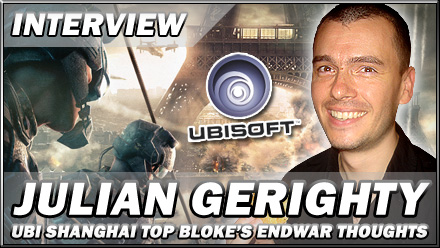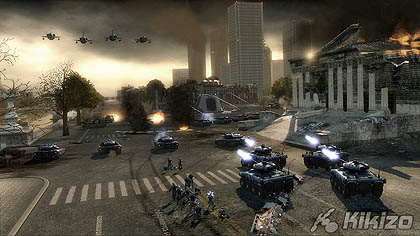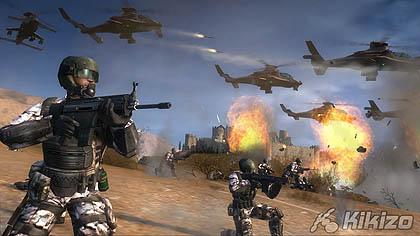Tom Clancy's EndWar: Julian Gerighty Interview
We talk to Ubisoft Shanghai's all-round top-bloke to find out if this really is the war to end all wars.

Page: 1 2
Tom Clancy's EndWar is out to put a couple of ICBMs through the notion that real-time strategy isn't a good fit for console gaming. As most readers will know, it intends to do this primarily by way of a voice-operated command scheme, deftly sidestepping the deficiencies of pad control.
When the game was officially unveiled some reactionary commentators denounced this as a gimmick, but we were ready to give Ubisoft the benefit of the doubt, especially in light of Sony's similarly talkative and thoroughly enjoyable SOCOM shooters.
Indeed, by the time Alex managed to get his hands on a playable build (and somehow liken it to Nintendogs) we'd put together a full "Command Bunker" sofa setup in readiness for launch in November, with President Adam pacing manfully and muttering "God help us all" at tactical intervals, while Ian gets to be the comms bloke with a buzz-cut and Stuart's job is to burst in every five minutes holding his GCSE Politics revision notes, shouting unhelpful things like "They're tracking another bogey off the Rockies." Yes sir, Kikizo isn't adverse to the odd global meltdown.
Having quizzed Creative Director Michael de Plater in May, we returned to ask Julian Gerighty, Ubisoft Shanghai's Editorial Content Director and all-round top-bloke, whether this really is the war to end all wars.
Kikizo: You've talked a lot about how Ubisoft's latest batch of Tom Clancy games will be the start of a new Tom Clancy. Do you think EndWar is going to be the new flagship title, or will Splinter Cell continue to be Clancy's public face?
Gerighty: It's difficult to say. I think the whole point of Tom Clancy as a brand is to offer certain values that are true across all of these experiences. For me, the use of having Tom Clancy associated with EndWar is that it gives us a setting, it gives us a certain amount of realism - it gives us a "Day-After-Tomorrow" setting. Those things are very valuable. Having one [game] as a flagship doesn't make sense, because the way I'd like to see it is crossing very different experiences.
EndWar is obviously strategy on a massive level. Splinter Cell is a character-based, spy thriller Jason Bourne type of thing. Rainbow Six - anti-terrorist unit. Ghost Recon - soldier of tomorrow. So they're all different experiences. And HAWX - stupid title, but great game.
Kikizo: Like HAWX, EndWar has been in development for three years. Why has it taken you a while to get the game made?
Gerighty: The mandate was to create the most massive, epic battles you've ever seen on a console. And at the time, nobody at Ubisoft was really doing strategy games. So we had to scout - and this is where we kicked it off - we had to scout for talent that could help us out doing that. About three-and-a-half, four years ago there was a little game called Rome: Total War that was making a big impression with massive battles. So we said "OK - the guys behind this, we've got to get them." So we recruited Michael de Plater as the creative director. He was the creative director of the whole Total War series - Shogun, Medieval, Rome, he was behind all those.
He brought over a couple of key talents - lead AI - [and] identified other people in the industry such as the lead level designer for Command and Conquer and Battle for Middle Earth. We poached those... we built this sort of very PC-focussed team, and then complimented that with all the console experience on all the Tom Clancy titles that we have. That's why we have ten different nationalities, and Shanghai was the ideal place to do it. Bring in all of those talents and you really create something brand new.
So it started that long ago because you had to form that kind of team around a mandate, a vision, that is pushing gaming forwards. I hate to think of it as a brand - I like to think of it as a real different experience in terms of strategy. Did you play Command of Conquer 3 or Battle for Middle Earth 2? They're obviously great not made for console. They're obviously made for a keyboard and a mouse.
Kikizo: But console strategy games are starting to get a lot more convincing, aren't they - take Halo Wars for instance. There's something that just wouldn't have been attempted last generation - I mean, simply in terms of the resolution alone...
Gerighty: Yeah, sure. There's a great strategy game that came out recently... not Universe at War... Supreme Commander, that's the one. Such a generic title, but such a great game. It [has] scale and complexity, and it's always adding a different layer. We really have more of Advance Wars as a reference - the DS game from Nintendo - and sports games, like Madden. So we started looking at how those games approached the design, approached the experience, and applying some different rules.
So the first thing we changed was the camera. Instead of having that top-down camera, which is very suitable for a mouse and keyboard, we dipped it down, we put it on the battlefield, which is almost more like Madden going from 2D to 3D - putting the camera right by the quarterback. This is something Bioware did super well when they went from Neverwinter Nights to Knights of the Old Republic. We're not too proud to steal - we stole that there, it's perfect...
Kikizo: Not too proud to talk about it either!
Gerighty: No, exactly! At the end of the day the experience only benefits from our knowledge of what other people have done right. It hasn't yet been applied to the strategy genre, but I'll be very honest - I'll be surprised if strategy games don't come out more like this from now on.
Page: 1 2













 Satoru Iwata Video Interview - the late Nintendo president spoke with Kikizo in 2004 as 'Nintendo Revolution' loomed.
Satoru Iwata Video Interview - the late Nintendo president spoke with Kikizo in 2004 as 'Nintendo Revolution' loomed. Kaz Hirai Video Interview - the first of Kikizo's interviews with the man who went on to become global head of Sony.
Kaz Hirai Video Interview - the first of Kikizo's interviews with the man who went on to become global head of Sony. Ed Fries Video Interview - one of Xbox's founders discusses an epic journey from Excel to Xbox.
Ed Fries Video Interview - one of Xbox's founders discusses an epic journey from Excel to Xbox. Yu Suzuki, the Kikizo Interview - we spend time with one of gaming's most revered creators.
Yu Suzuki, the Kikizo Interview - we spend time with one of gaming's most revered creators. Tetris - The Making of an Icon: Alexey Pajitnov and Henk Rogers reveal the fascinating story behind Tetris
Tetris - The Making of an Icon: Alexey Pajitnov and Henk Rogers reveal the fascinating story behind Tetris Rare founders, Chris and Tim Stamper - their only interview? Genuinely 'rare' sit down with founders of the legendary studio.
Rare founders, Chris and Tim Stamper - their only interview? Genuinely 'rare' sit down with founders of the legendary studio. The History of First-Person Shooters - a retrospective, from Maze War to Modern Warfare
The History of First-Person Shooters - a retrospective, from Maze War to Modern Warfare